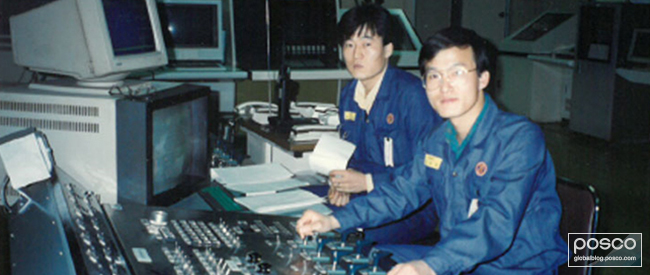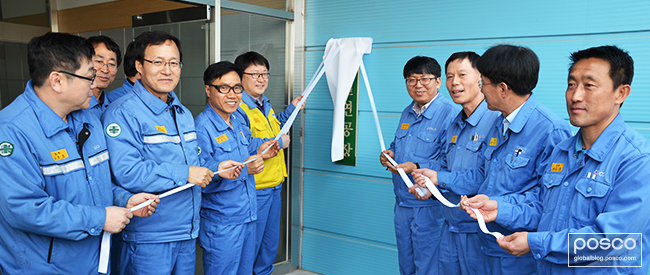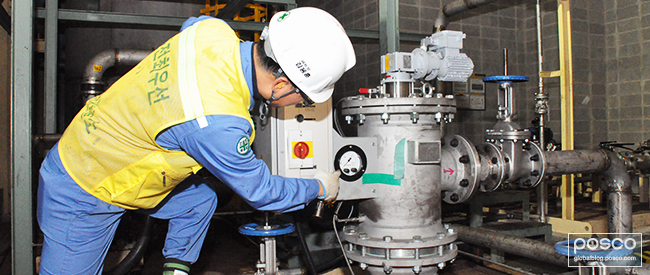Kim Yong-Hoon always had a knack for making things with his hands. As a child, he whipped up the most popular toys such as cars, trains and slings by hand. That may be why Kim learned to be independent and self-sufficient early on. After graduating from middle school, he moved out to live on his own to attend high school in a different town. It was also his decision to apply to POSCO as soon as he graduated, and ever since he started at the hot rolling department at Gwangyang Steel Works, he has been using his talents to make things easier, safer and better for his fellow employees.
His beginnings at Gwangyang Steel Works
After entering the company, Kim Yong-hoon directly operated the hot-coil production line at the No. 2 Hot Rolling Mill’s operation cabin. At the time, all of the hot rolling equipment had to be operated manually, and Kim operated the speed drive which controlled tension during the rolling process and the reduction operation which determined the thickness of the sheets of steel and the actual rolling itself. Because everything was done manually, workers learned through experience, and new workers made lots of costly mistakes. Dealing with the aftermath of accidents was another physical burden on the workers.
Kim recalls, “One time, a foreign guest visited the mills. He approached me for a handshake, but I couldn’t take my hands off of the operation board for even a second to shake his hand. That’s how focused you had to be to operate the mills back then. After 13 years of doing that, I knew we needed an automated system. That’s why in 2003, I willingly joined the Finishing Mill No Touch Operation Task Force Team (TFT).” The TFT worked to implement an automated system, but when they could not produce the desired results in a year, the team was dismantled.
Following the TFT, Kim Yong-Hoon worked in facility management and quality assurance. In order to produce high-quality products and minimize the number of defects, workers had to be flawless in facility management and operations. Again, Kim knew that the only way to achieve this was through automated operations, but it was too difficult to implement an automated system in an existing mill.
A New TFT, A New Opportunity
As demand for high-strength steels surged in 2012, including for automotive steel sheets and API steel sheets (oil pipelines, oil-related structural steel products, etc.), POSCO decided to establish a TFT for the construction of the No. 4 Hot Rolling Mill at Gwangyang Steel Works. Kim Yong-hoon, who was eager to apply automated systems and enhanced the quality of steel products, joined the TFT.
The construction of the No. 4 Hot Rolling Mill was special because it was the first mill to be built independently, without relying on Japanese firms that previously provided all the technology and equipment. In order to become technologically independent, the TFT had to research everything from scratch. That way, they could work in the automated operations systems from the design stage. In the end, the No. 4 Hot Rolling Mill opened in Gwangyang on October 30, 2014. The automation technology Kim and the TFT applied to the mill greatly increased the quality and quantity of production of high strength steels. However, Kim Yong-Hoon didn’t stop there and continued to enhance the mill’s technology.
FM Full-Length Hydraulic Oil Application Technology
Kim was the first in Korea to come up with the finishing mill (FM) full-length hydraulic oil application technology and applied it to the No. 4 Hot Rolling Mill. This new technology ensures the quality of high-strength steel surfaces in its finishing stage.
Traditionally, the rolling process for high-strength steels is more difficult because when the tough material passes through the rollers, it causes severe rolling fatigue and vibration due to high resistance. However, there is a way to eliminate rolling fatigue and vibration. By spraying oil on the rolling equipment, an oil film is formed between the roller and the rolled material. This oil film can transmit a large amount of force with less effort, meaning the steel will roll with less fatigue and vibration. While using hydraulic oil is common, what is different about this technology is that the oil can be applied to the full length of the rolled material, without worrying about slippage.
“I worked closely with the research department and equipment engineers to develop this technology. We ultimately came up with a way to remove the oil as soon as one roll is finished, before the next one begins to eliminate slippage. We got rid of the misconception that you can’t spray oil on the full length of the rolled material. As a result, we decreased the occurrence of scales from 0.83 percent in 2015 to 0.23 percent in the first half of 2017. The number of times irregular replacements occurred decreased from 20 times in 2015 to 7 times in 2017. We also expanded giga-grade steel production from 20 steel grades in 2015 to 30 steel grades in the first quarter of 2017. Due to the impressive results, the technology was chosen as a second-grade proposal this year.”
No Touch Operation Technology
Kim then went on to find implement the use of big data at the mill for increased efficiency and performance. He took the settings that the operators inputted manually for the operation equipment and turned it into big data in the form of an operations table, and continuously accumulated data for the automatic operations equipment program, or No Touch Operations.
“I vowed to implement the No Touch operations technology to the No. 4 Hot Rolling Mill from its early construction stage. Because it was my first time, I made numerous mistakes. However, after a year of accumulating data on the shape of the rollers and on the final crown, we are now entering the stabilization phase. Even now, we are gathering significant data to increase the accuracy and efficiency of operations and we are updating the information whenever we have to apply it to a new material. The data table is really the key to the No. 4 Hot Rolling Mill’s success.”
Kim further applied the No Touch operation technology to speed operations to keep the tension of the rolled material constant and prevent the material from leaning to the left or right using loopers. Kim says, “This process also took one year of research and failures to develop. The new hydraulic looper is 5 times faster than traditional motor loopers. The increased efficiency allowed us to go from needing 2 operations desks to only one and we allocated the remaining speed driver to quality improvement work. As a result, we have increased the added value of high strength steels produced at the No. 4 hot strip rolling mill.”
Equipped with all the new technology, the No. 4 Hot Rolling Mill surpassed the record production capacity of 3.5 million tons and reached 3.9 million tons in 2015 and 4.1 million tons in 2016. To add, the production share of POSCO’s World Premium products for the No. 4 Hot Rolling Mill increased from 44.3 percent in 2015 to 67.3 percent in the fourth quarter of 2016 and reached 71.2 percent in the first quarter of 2017. The work rate also increased from 92.42 percent in 2015 to 96.02 percent this year and the quality nonconformity rate dropped from 1.67 percent to 0.64 percent in the same time span.
The Mindset of a Master
Kim Yong-Hoon was able to come up with numerous improvements to the operation systems at POSCO’s No. 4 Hot Rolling Mill because he views everything as a potential problem. He is always looking for ways to improve the production process and equipment, even if things appear to be working fine.
Kim’s goals for the future are straightforward. “We will do our best to make a sustainable POSCO by lowering the cost of products and raising the quality and production of high value-added steel.” His consciousness of potential problems and solutions is what lead to his achievements that include 18 proposals for representative registration and 11 proposals for joint participation. He also obtained a patent for his Variable Hot-Rolled Bite Cooler Header, which was awarded the A-grade by the POSCO Research Institute. This year, he is a POSCO Master of Korea, and he shows no signs of slowing down in his search for new technology and innovations to prevent accidents and improve POSCO’s products.
- 2017
- api steel sheets
- automation
- automotive steel
- automotive steel sheets
- equipment
- finishing mill
- Gwangyang Steel Works
- Hot Rolling Mill
- Hydraulic Oil
- Hydraulic Oil Application Technology
- material
- No Touch Operation
- oil pipeline
- POSCO
- posco expert
- posco master
- posco professional
- prevent accidents
- production
- research
- steel expert
- steel master
- steel production
- steel production plant
- steel professional
- steel sheets
- steel work
- task force team
- TFT



